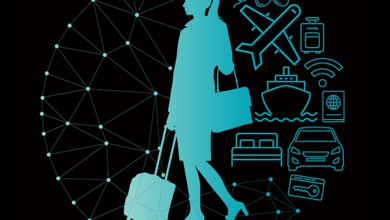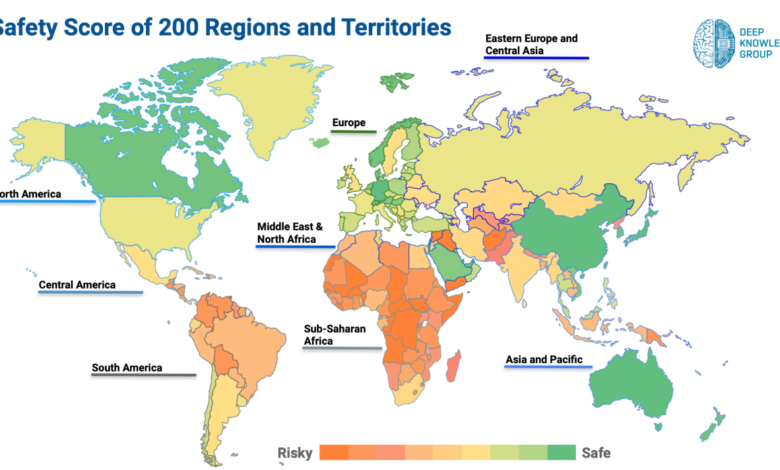
Be Safe, Travel the World
Be safe travel the world is crucial for any traveler. This comprehensive guide delves into essential pre-trip planning, safety strategies while abroad, cultural considerations, emergency procedures, digital security, financial planning, and health precautions. It’s more than just a checklist; it’s a roadmap to ensure you have a fantastic and secure journey.
From researching safe destinations to understanding local customs, this guide provides practical advice for every stage of your trip. It emphasizes the importance of preparation, awareness, and respect for different cultures. Ultimately, it’s about making the most of your travel experience while prioritizing your well-being and safety.
Planning a Safe Trip
Embarking on an international adventure requires meticulous preparation to ensure a smooth and secure journey. Careful planning, encompassing research, documentation, and safety precautions, is paramount for a positive travel experience. Understanding potential risks and proactively mitigating them can significantly enhance the enjoyment and safety of your trip.
Essential Documents for International Travel
Proper documentation is crucial for a seamless international journey. Visa requirements, passport validity, and health certificates are essential components of a comprehensive travel plan. Failure to have the necessary documentation can lead to delays or even denial of entry into a country.
- Passport: A valid passport is the primary identification document for international travel. Ensure its validity extends beyond your intended travel dates, as some countries require a certain duration of validity beyond the planned stay.
- Visa Requirements: Research and obtain any necessary visas well in advance. Visa requirements vary significantly by country and are contingent on your nationality and intended activities during your stay.
- Health Certificates: Some countries may require specific health certificates, such as yellow fever vaccinations. Consult with your healthcare provider or local health authorities to ascertain the necessary health certificates.
Researching Safe Destinations
Thorough research on potential destinations is vital for a safe and enjoyable trip. Analyzing current global events and security advisories is critical to understanding potential risks.
- Current Global Events: Stay informed about current global events, including political instability, natural disasters, and security concerns in your destination. Reliable news sources and official government travel advisories are essential for accurate and up-to-date information.
- Security Advisories: Refer to official government travel advisories for security warnings, travel restrictions, or potential risks associated with your intended destination. Consult these resources to understand the current security landscape.
Pre-Trip Preparations Checklist
A comprehensive checklist for pre-trip preparations can streamline your travel arrangements and ensure a smooth experience. This checklist includes crucial aspects such as vaccinations, travel insurance, and emergency contacts.
- Vaccinations: Consult with your doctor about necessary vaccinations for your destination. Some vaccinations require a specific timeframe before travel, so plan accordingly.
- Travel Insurance: Purchase comprehensive travel insurance that covers medical emergencies, lost luggage, trip cancellations, and other unforeseen circumstances. Compare different providers to find the best coverage at an affordable price.
- Emergency Contacts: Provide your itinerary to trusted family members or friends. Share your emergency contacts with them. Keep contact information for your embassy or consulate in your destination country readily accessible.
Understanding Local Laws and Customs
Respecting local laws and customs is essential for a positive and safe travel experience. Understanding cultural nuances and social etiquette can help avoid misunderstandings and ensure a harmonious interaction with locals.
- Local Laws: Research the local laws and regulations of your destination. Understand legal restrictions, cultural norms, and any specific guidelines related to your activities.
- Cultural Norms: Learn about the local customs, traditions, and social etiquette of your destination. Understanding these aspects can help you navigate interactions with locals respectfully and avoid cultural misunderstandings.
Choosing Reliable Transportation Methods
Selecting reliable transportation methods is crucial for a safe journey. Prioritize safety and security when choosing transportation options.
- Transportation Options: Research different transportation options, such as trains, buses, and taxis. Choose reputable and well-reviewed transportation providers for a safe journey.
- Safety Considerations: Evaluate the safety and security of transportation methods based on reviews, recommendations, and official safety records. Research any potential risks associated with specific transportation methods in your destination.
Finding Safe and Affordable Accommodations
Selecting suitable accommodations is a vital part of planning a safe and enjoyable trip. Prioritize safety and security while maintaining affordability.
- Accommodation Options: Consider a range of accommodation options, such as hotels, hostels, guesthouses, or Airbnb. Read reviews and choose accommodations with a proven safety record.
- Budget Considerations: Compare prices and amenities across different accommodation options to find a balance between safety, comfort, and affordability. Factor in potential costs for travel and activities.
Preparing for Potential Medical Emergencies
Medical emergencies can occur during travel, and adequate preparation is essential. Knowing how to handle potential medical situations can save time and stress in an emergency.
- Emergency Preparedness: Have a plan in place for potential medical emergencies. Pack any necessary medications and keep them readily available. Research local healthcare facilities and emergency services in your destination.
- Medical Information: Inform your travel insurance provider about any pre-existing medical conditions or allergies. Maintain a record of your medical history and necessary medications.
Comparing Travel Insurance Providers
Selecting appropriate travel insurance is vital for safeguarding your trip. Compare different providers to ensure the best coverage and benefits.
| Insurance Provider | Coverage | Benefits |
|---|---|---|
| Company A | Comprehensive medical coverage, trip cancellation, lost luggage | 24/7 emergency assistance, pre-authorization of claims |
| Company B | Extensive medical coverage, trip interruption, baggage delay | Flexible policy options, competitive pricing |
| Company C | Wide range of coverage options, including adventure activities | Customer support available in multiple languages, online claim filing |
Staying Safe During Travel
Traveling the world can be an incredible experience, but it’s essential to prioritize safety. Being aware of your surroundings and taking proactive steps can significantly reduce potential risks. This section delves into practical strategies for staying safe during your adventures, from managing your belongings to handling unexpected situations.Staying vigilant and informed is crucial for a safe and enjoyable trip.
Knowing how to navigate unfamiliar environments, protect your personal information, and respond appropriately to various situations will contribute to a more secure and memorable journey.
Staying Aware of Surroundings in Unfamiliar Locations
Understanding your surroundings is a fundamental aspect of personal safety, especially in unfamiliar places. Observing your surroundings, identifying potential hazards, and being aware of your immediate environment will minimize the likelihood of encountering dangerous situations. Be observant of your surroundings, pay attention to the people around you, and avoid walking alone in poorly lit or isolated areas at night.
Maintain a heightened sense of awareness of your immediate environment, particularly in crowded or unfamiliar places.
Safe Practices for Using Technology During Travel, Be safe travel the world
Technology plays a vital role in modern travel, but it’s important to use it safely. Secure communication and data protection are paramount. Utilize strong, unique passwords for all online accounts, and enable two-factor authentication whenever possible. Be cautious about sharing personal information online, and avoid connecting to public Wi-Fi networks without a VPN. Consider using a secure messaging app for communicating with loved ones.
Traveling the world safely is key, but unexpected hiccups can pop up. For example, recent news about Aker halting delivery of building materials for an NCL ship ( aker halts delivery of building materials for ncl ship ) highlights the importance of staying informed and flexible when planning a trip. Still, the thrill of exploring new places outweighs any minor setback, so don’t let potential delays dampen your wanderlust.
Embrace the journey and be safe out there!
Managing Personal Belongings and Valuables
Protecting your belongings is crucial for a smooth and worry-free trip. Keep valuables close to you at all times. Avoid displaying expensive jewelry or electronics in public. Use secure hotel safes or carry-on luggage locks for storing valuables.
Avoiding Petty Theft and Scams
Being aware of common scams and petty theft tactics can prevent potential losses. Be wary of individuals offering assistance or directions that seem too good to be true. Do not accept unsolicited help from strangers. Avoid displaying large sums of cash, and be mindful of your surroundings in crowded areas. Be cautious when using ATMs, especially in less populated areas.
Embarking on a global adventure is exhilarating, but prioritizing safety is paramount. Knowing how online travel agencies (OTAs) advertise and market themselves, like those early pioneers discussed in advertising and the pioneer OTAs , can help travelers make informed choices. This knowledge, combined with sensible precautions, makes exploring the world a truly rewarding experience.
Handling Unexpected Situations
Unexpected situations can occur during travel. Having a plan in place can help mitigate the impact of such events. Have copies of important documents, such as passports and tickets, stored electronically and in a separate physical location. Inform someone of your travel plans and itinerary, including the contact information of your accommodations. In case of lost luggage, immediately contact the airline or hotel.
If you encounter an emergency, contact local authorities or your embassy.
Informing Someone About Your Travel Plans and Itinerary
Sharing your travel plans and itinerary with a trusted individual is a crucial safety measure. This allows someone to be aware of your whereabouts and contact information. Share your travel plans with a friend or family member, including your planned route, accommodations, and estimated return date.
Staying Connected to Loved Ones During Your Trip
Maintaining contact with loved ones is important for peace of mind during travel. Utilize various communication methods, such as messaging apps or video calls, to stay in touch. Use a portable Wi-Fi hotspot or international calling plan to ensure consistent communication.
Appropriate Responses to Potentially Dangerous Situations
| Situation | Appropriate Response |
|---|---|
| Aggressive behavior from a stranger | Maintain a calm demeanor, avoid eye contact, and move away from the situation if possible. |
| Pickpocketing attempt | Be alert, protect your belongings, and if possible, subtly inform the person of your awareness of the attempted theft. |
| Lost or stolen passport | Contact your embassy or consulate immediately. |
| Sudden illness or injury | Seek medical attention and inform your travel companion or local authorities. |
| Getting separated from your group | Try to locate your group, or seek assistance from a trusted authority figure. |
Cultural Sensitivity and Respect: Be Safe Travel The World
Traveling the world opens doors to diverse cultures, customs, and traditions. Understanding and respecting these differences is crucial for a positive and enriching experience. This involves more than just avoiding offense; it’s about engaging with the local community on a deeper level, fostering genuine connections, and appreciating the unique perspectives of others. It is also vital to remember that cultural norms are constantly evolving, and even within a single country, there can be regional variations.Respecting local customs and traditions is paramount to building positive relationships and avoiding unintended offenses.
This includes mindful observation of local etiquette, understanding the significance of certain gestures, and recognizing the nuances of communication styles. It is also important to approach each interaction with an open mind and a willingness to learn.
Cultural Norms and Etiquette Guidelines
Understanding the cultural norms and etiquette guidelines of different countries can help travelers avoid misunderstandings and show respect. Cultural norms encompass a broad range of behaviors, from greetings and table manners to personal space and communication styles. By learning about these nuances, travelers can better navigate social situations and build positive relationships with locals.
- Japan: Removing your shoes before entering homes and specific spaces is crucial. Respecting elders is a fundamental part of Japanese culture, and using polite language is essential. Queue discipline is highly valued.
- Thailand: Showing respect for the monarchy is important. Avoid touching someone’s head, as it is considered disrespectful. Using the appropriate titles when addressing people is critical.
- India: Using the right hand for eating and receiving gifts is common. Removing your shoes before entering a home is generally appreciated. Respecting religious practices and customs is paramount.
- France: Maintaining a certain level of formality in social interactions is common. Queue discipline is generally observed, and direct communication is valued.
Importance of Respecting Local Customs
Respecting local customs is fundamental to a positive travel experience. It fosters mutual understanding and appreciation between travelers and the local community. This respect extends to religious practices, traditional ceremonies, and local traditions. Demonstrating respect for these elements creates a welcoming environment and fosters cultural exchange.
Strategies for Effective Cross-Cultural Communication
Effective communication across cultures is crucial for navigating social interactions. It involves active listening, asking clarifying questions, and being mindful of nonverbal cues. Understanding that language barriers can exist, and that gestures may have different meanings in different cultures is key to preventing misinterpretations.
- Active listening: Paying close attention to what others are saying, both verbally and nonverbally, is critical to understanding their perspective.
- Asking clarifying questions: When unsure about something, it’s perfectly acceptable to ask questions to ensure you understand the context.
- Nonverbal communication: Being aware of potential cultural differences in nonverbal communication, such as gestures, facial expressions, and personal space, is vital.
Navigating Potential Misunderstandings and Conflicts
Cultural misunderstandings can occur even with the best intentions. Approaching such situations with patience, empathy, and a willingness to seek clarification can help mitigate potential conflicts. Apologizing sincerely if an unintentional offense is committed is crucial.
Globetrotting can be exhilarating, but safety is paramount. Understanding best practices for safe travel is crucial. Resources like Apple Leisure Group’s thought leadership, focusing on responsible tourism and travel safety, apple leisure group thought leadership , offer valuable insights. By learning from these strategies, you can navigate the world with confidence and peace of mind, ensuring your adventures are truly memorable and safe.
Cultural Norms Regarding Personal Space and Physical Contact
Personal space and physical contact vary significantly across cultures. In some cultures, close physical proximity is the norm, while in others, a greater distance is preferred. Observing and respecting these differences is vital for a smooth travel experience.
| Culture | Personal Space | Physical Contact |
|---|---|---|
| Latin America | Close proximity | Frequent physical contact |
| Northern Europe | Greater distance | Less physical contact |
| Japan | Moderate distance | Limited physical contact |
Examples of Appropriate and Inappropriate Behaviors
Appropriate and inappropriate behaviors vary greatly depending on the cultural context. For example, wearing certain clothing or expressing opinions in a specific manner may be acceptable in one culture but not in another. Observing local customs and traditions can help travelers avoid making unintentional mistakes.
Respecting Local Beliefs and Values
Respecting local beliefs and values is crucial for a harmonious travel experience. This includes being mindful of religious practices, traditional ceremonies, and cultural sensitivities. Avoid actions or expressions that could be considered offensive or disrespectful.
Cultural Differences in Greetings and Gestures
Understanding cultural differences in greetings and gestures is vital for a positive interaction. Different cultures have various ways of greeting one another, using handshakes, bows, or other forms of physical contact.
| Culture | Greeting | Gesture |
|---|---|---|
| Japan | Bow | Nodding |
| France | Hand shake | Direct communication |
| India | Namaste | Using the right hand for eating and receiving gifts |
| Thailand | Wai | Avoiding touching someone’s head |
Emergencies and Safety Procedures
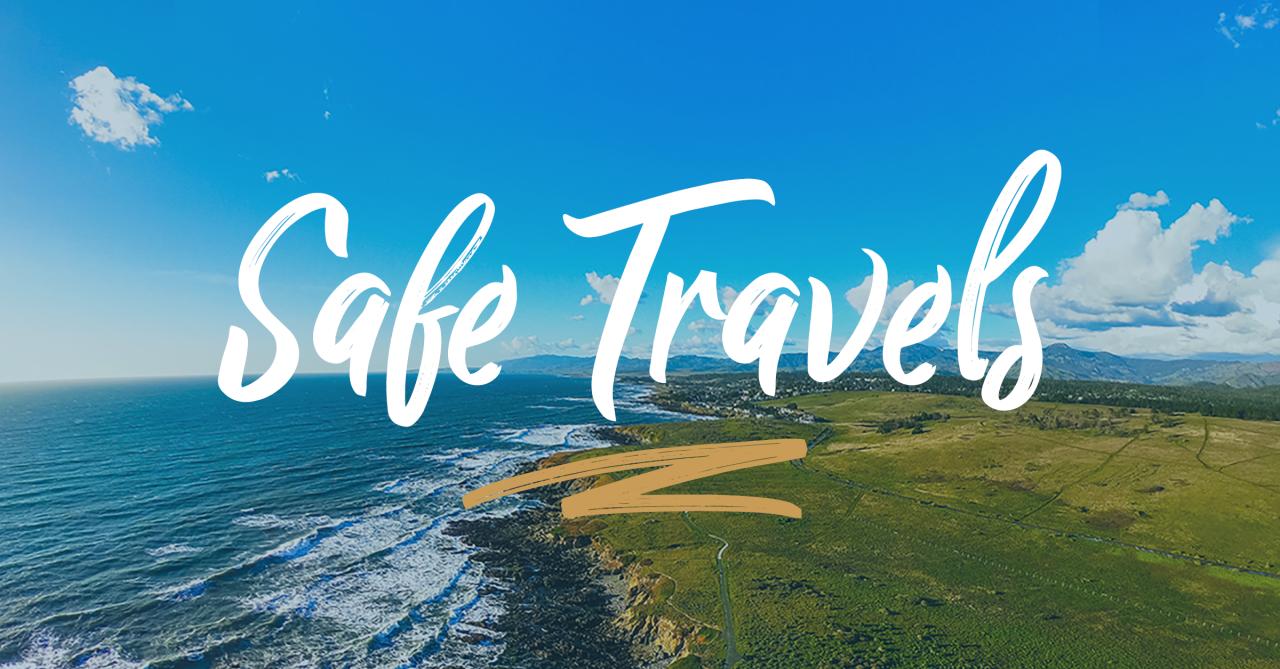
Traveling the world can be an incredible adventure, but it’s crucial to be prepared for unexpected situations. Having a plan in place for emergencies ensures you can stay safe and get the help you need if something goes wrong. This section details essential emergency procedures and contact information to keep you safe and secure while exploring new destinations.
Emergency Contact Information and Procedures
Knowing how to access emergency services is vital. This includes local emergency numbers, as well as contact details for your embassy or consulate. Familiarizing yourself with these procedures before you leave can greatly reduce stress in a crisis.
Reporting Crimes or Incidents
Knowing how to report crimes or incidents is crucial for ensuring your safety and allowing authorities to take appropriate action. Local police stations or relevant authorities should be contacted promptly in case of an incident. Note the incident details, time, location, and any witnesses to help with the report.
Obtaining Local Emergency Numbers
Before traveling, research and note down the emergency numbers for the country or region you’re visiting. This includes the general emergency number, as well as specific numbers for police, fire, and ambulance services. Keep this information readily accessible, either written down or saved on your phone. Examples include 911 in the United States, 999 in the UK, and 112 in many European countries.
Seeking Help if Lost or Separated
Being lost or separated from your group can be distressing. If you find yourself in this situation, stay calm and try to remember the last known location and landmarks. Alert someone immediately and explain your situation clearly. Inform local authorities or a trusted contact if possible. Have a pre-arranged meeting point with your group in case of separation.
Obtaining Assistance in Case of Medical Emergencies
Medical emergencies can arise unexpectedly. Understanding how to get medical help in a foreign country is essential. Have a readily available list of medical conditions, medications, and allergies. Inform your travel insurance company about your trip and medical conditions, and keep a copy of your insurance details. Have a list of local hospitals or clinics.
Useful Phrases in Different Languages for Emergencies
Knowing basic phrases in the local language can be incredibly helpful in an emergency. These phrases can help you communicate your needs to authorities or locals. Common phrases such as “I need help,” “I’m lost,” or “I’m injured” can be invaluable. Consider using a translation app or learning a few key phrases before you travel.
Example Phrases:
- I need help. (French: J’ai besoin d’aide)
- I’m lost. (Spanish: Estoy perdido/perdida)
- I’m injured. (German: Ich bin verletzt)
Contacting Embassies or Consulates in Case of Issues
Your embassy or consulate can provide valuable support if you encounter issues while traveling. Knowing their contact information is crucial. Keep a copy of your passport, visa, and other important documents. Maintain contact with your embassy or consulate during your trip. They can help with visa issues, lost documents, or legal assistance.
Contact Information for Various Emergency Services
A table outlining contact information for various emergency services in different countries will assist you in emergencies.
| Country | General Emergency Number | Police | Fire | Ambulance |
|---|---|---|---|---|
| United States | 911 | 911 | 911 | 911 |
| United Kingdom | 999 | 999 | 999 | 999 |
| France | 112 | 17 | 18 | 15 |
Protecting Your Digital Footprint
Traveling the world opens doors to incredible experiences, but it also exposes you to new digital risks. Protecting your personal information online is paramount, whether you’re snapping photos of landmarks or booking accommodations. This crucial step ensures your online presence remains secure and your travel adventures are worry-free.Strong passwords and secure Wi-Fi connections are the first line of defense against unauthorized access.
Failing to safeguard your digital footprint can lead to identity theft, financial loss, and even reputational damage. This section provides essential tips and resources to fortify your online security while exploring the globe.
Strong Passwords and Secure Wi-Fi
Robust passwords are essential for protecting your online accounts. Avoid using easily guessable passwords like “password123” or your birthday. Employ a combination of uppercase and lowercase letters, numbers, and symbols. Consider using a password manager to generate and store complex passwords securely. When using public Wi-Fi, exercise caution.
Avoid accessing sensitive information like banking details or personal documents. Use a VPN to encrypt your connection, enhancing security significantly.
Avoiding Phishing Scams and Online Threats
Phishing scams are prevalent, often disguised as legitimate emails or messages. Be wary of unsolicited emails requesting personal information or account details. Verify the sender’s authenticity and never click on suspicious links. Regularly update your software to patch security vulnerabilities. Be vigilant about suspicious websites and downloads.
Traveling the world safely is paramount, especially when considering the many factors at play. Recent news about Ambassadors selling their marine division, as detailed in this article ambassadors sells marine division , highlights the importance of thorough research and understanding the potential implications of such changes. Staying informed about travel destinations and companies you’re considering can help you stay safe and enjoy your journeys.
Employ strong antivirus and anti-malware software. Never share your passwords or personal information with anyone.
Using VPNs and Secure Browsing Practices
VPNs (Virtual Private Networks) create an encrypted connection between your device and the internet. This protects your data from prying eyes, masking your IP address and enhancing privacy. Use a reputable VPN provider with a strong track record of security. Employ secure browsing practices by using HTTPS whenever possible. HTTPS ensures your data is encrypted during transmission.
Browse only trusted websites.
Resources for Protecting Your Online Identity
Numerous resources can assist you in safeguarding your online identity. Consult reputable cybersecurity websites and organizations for up-to-date information and best practices. Familiarize yourself with your financial institution’s security guidelines. Stay informed about common online threats and scams. Review your privacy settings on social media platforms to limit the amount of personal information visible to the public.
Disabling Location Services
Location services can be convenient, but they can also expose your whereabouts to potential risks. Disable location services when not needed, especially when using public Wi-Fi. This prevents your location from being tracked by third-party applications or websites. Restrict app permissions to limit access to your location. Consider using a location spoofing app (with caution) to mask your real location.
Comparison of VPN Providers
| VPN Provider | Security Features | Privacy Features |
|---|---|---|
| ExpressVPN | Strong encryption, robust security protocols (OpenVPN, WireGuard), kill switch | No-logs policy, strong encryption |
| NordVPN | Military-grade encryption, double VPN, obfuscation | Strict no-logs policy, multi-factor authentication |
| Surfshark | Strong encryption, kill switch, cleanWeb | No-logs policy, unlimited simultaneous connections |
Note: This table provides a simplified comparison. Detailed security and privacy features may vary among providers and are subject to change. Always verify the latest information directly from the provider’s website.
Financial Security
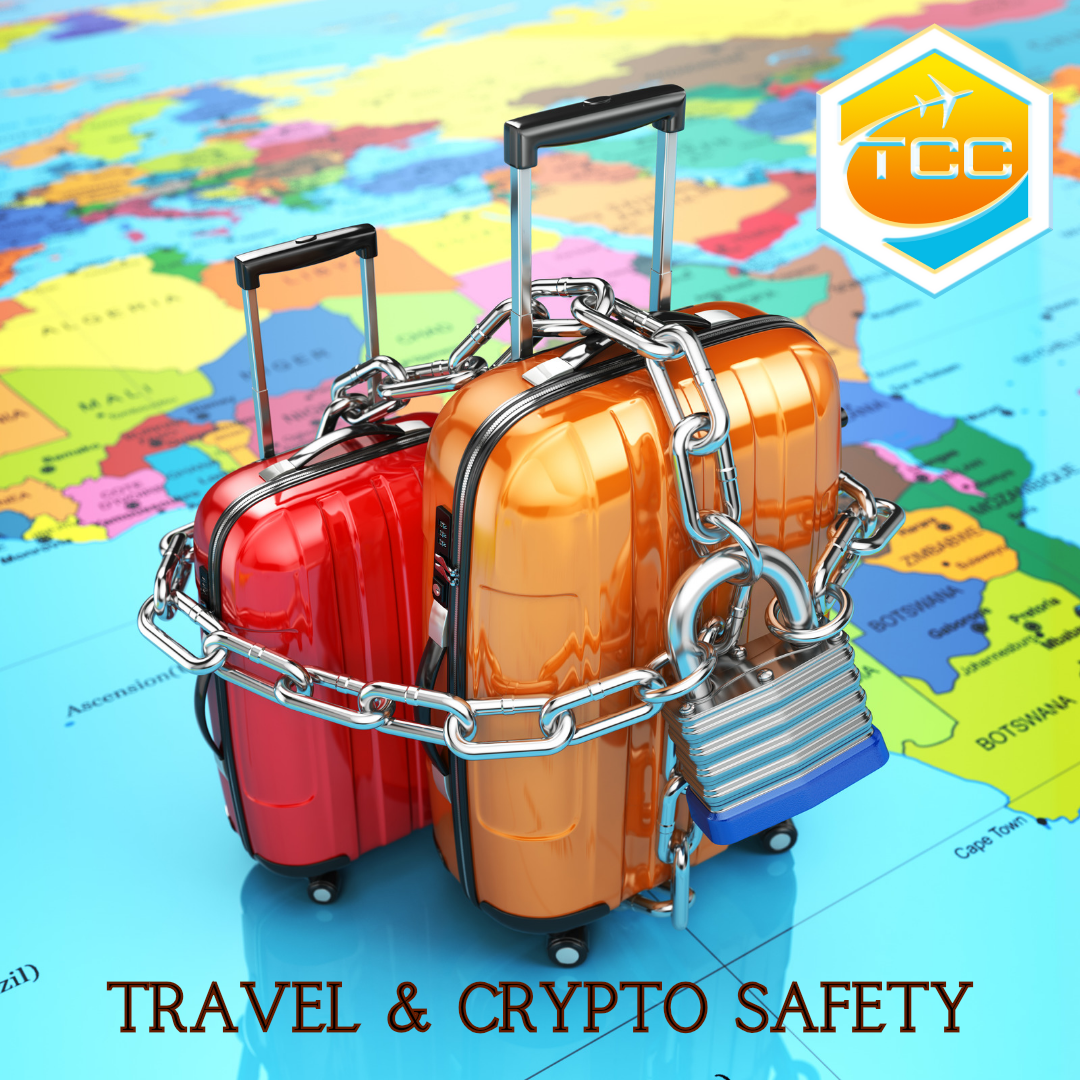
Traveling the world can be exhilarating, but it’s crucial to prioritize financial security. Planning your budget, understanding potential scams, and knowing how to handle unexpected situations are essential for a smooth and worry-free adventure. This section will equip you with practical strategies to manage your finances effectively during your travels.Maintaining a healthy financial state during your travels is a key component to a safe and enjoyable trip.
Financial preparedness is a proactive measure to prevent unexpected issues and promote peace of mind, ensuring that your exploration of the world is uninterrupted by financial worries.
Budgeting and Avoiding Overspending
Effective budgeting is paramount to preventing overspending during your travels. Create a detailed budget that accounts for accommodation, transportation, food, activities, and any other potential expenses. Use budgeting apps or spreadsheets to track your spending meticulously. Before your trip, set daily or weekly spending limits to prevent impulsive purchases. Research prices in advance for popular tourist attractions to compare and find better deals.
Negotiate prices where appropriate and look for free or low-cost activities to maximize your budget.
Currency Exchange
Safe and efficient currency exchange is crucial. Avoid exchanging currency at airports or touristy areas where exchange rates might be less favorable. Instead, utilize reputable banks or exchange services with competitive rates. Consider using a travel credit card with favorable exchange rates and zero international transaction fees. Exchange larger amounts of money before your trip, using reputable providers.
Pre-load your debit or credit cards with a currency you will use during your trip.
Using Credit and Debit Cards Abroad
Inform your bank about your travel plans to avoid your cards being blocked. Notify your bank about the countries you will be visiting. Always double-check the transaction details to verify the correct amounts and currency. Use ATMs or bank branches whenever possible for transactions, instead of street vendors or unregulated money changers.
Using ATMs and Avoiding Scams
ATM use should be approached cautiously. Select well-lit and secured ATMs located within banks or reputable establishments. Be vigilant for any suspicious activity around the ATM, such as individuals observing your PIN entry or transactions. Avoid using ATMs in remote or poorly lit areas. Never disclose your PIN to anyone.
Be aware of skimming devices and ensure the ATM’s keypad is free of any foreign objects.
Handling Unexpected Financial Issues
Unexpected financial issues can arise during any trip. Ensure you have sufficient emergency funds readily available. Contact your credit card companies or bank immediately if your card is lost or stolen. Document all transactions carefully, including dates, amounts, and locations. Inform your embassy or consulate about any financial difficulties you encounter.
Transferring Money Abroad
| Method | Description | Pros | Cons |
|---|---|---|---|
| Wire Transfer | Transferring funds through banks. | Secure, widely available | Can be slow, potentially expensive |
| Money Transfer Services | Services like Western Union or MoneyGram | Fast, readily available | Higher fees, less secure |
| Debit/Credit Card Transfers | Transferring funds using debit or credit cards. | Convenience | Potentially higher fees, exchange rate fluctuations |
| Online Banking Transfers | Transferring funds using online banking platforms. | Convenience, potential lower fees | May not be available in all countries |
These are some of the most common ways to transfer money abroad. Choose the method that best suits your needs based on speed, security, and cost.
Health and Safety Considerations
Traveling to new destinations opens doors to incredible experiences, but it’s crucial to be prepared for potential health risks. Understanding the specific health concerns in different regions, and taking proactive steps to protect yourself, significantly enhances your enjoyment and safety. Proper precautions, such as vaccinations and preventive measures, are essential for a worry-free adventure.
Potential Health Risks in Different Destinations
Various destinations present unique health risks, influenced by factors such as climate, sanitation levels, and prevalent diseases. Awareness of these risks allows you to take the necessary precautions to minimize the chances of falling ill. For example, areas with poor sanitation might have a higher risk of waterborne illnesses, while tropical regions are prone to mosquito-borne diseases. Thorough research and consultation with your doctor are crucial to understanding the specific risks associated with your planned itinerary.
Necessary Vaccinations and Precautions
Vaccinations are a cornerstone of travel health. Consult your doctor well in advance of your trip to discuss recommended vaccinations based on your destination and health status. Your doctor can provide personalized advice on the necessary vaccinations, booster shots, and any required medications. Pre-emptive measures, like taking malaria prophylaxis, are often vital in certain regions. It’s also essential to be aware of any potential health risks associated with local food and water sources, and to practice appropriate hygiene.
Staying Hydrated and Following a Healthy Diet
Maintaining adequate hydration and a healthy diet is crucial for your well-being during travel. Drinking plenty of clean water, avoiding contaminated sources, and eating fresh, locally sourced food can significantly reduce the risk of illness. Bringing along non-perishable snacks and familiar foods can also help you maintain your usual dietary habits and energy levels.
Maintaining Personal Hygiene
Practicing meticulous personal hygiene is vital to prevent illness. Regular handwashing, especially after using public restrooms and before eating, is a simple but effective way to limit the spread of germs. Using hand sanitizer, when soap and water aren’t available, is another important practice.
Sun Protection and Insect Repellent
Protecting yourself from the sun and insects is essential in many travel destinations. Using sunscreen with a high SPF, wearing protective clothing, and seeking shade during peak sun hours are important measures. Using insect repellent containing DEET or picaridin, and sleeping under mosquito nets, especially in regions with a high risk of mosquito-borne diseases, are crucial to prevent insect bites.
Insect Repellent and Mosquito Nets
Insect repellent and mosquito nets are essential tools for preventing insect-borne diseases. Choose a repellent with a high concentration of DEET or picaridin, and apply it according to the manufacturer’s instructions. Use mosquito nets when sleeping in areas where mosquito-borne diseases are prevalent. Sleeping under mosquito nets can significantly reduce your risk of mosquito bites and the diseases they transmit.
Globetrotting can be exhilarating, but staying safe is paramount. Knowing about potential issues, like the Alaskan cruise tax proposal back on docket ( alaska cruise tax proposal back on docket ), can help you prepare and make informed decisions. So, while you’re planning your next adventure, remember to prioritize safety for a truly unforgettable trip.
Common Health Concerns in Different Regions
| Region | Common Health Concerns |
|---|---|
| Tropical Regions | Malaria, Dengue fever, Zika virus, Chikungunya, Yellow fever |
| Developing Countries | Waterborne illnesses (cholera, typhoid), food poisoning, diarrhea |
| High-Altitude Regions | Altitude sickness (mountain sickness) |
| Areas with Poor Sanitation | Diarrhea, hepatitis A, parasitic infections |
Conclusive Thoughts
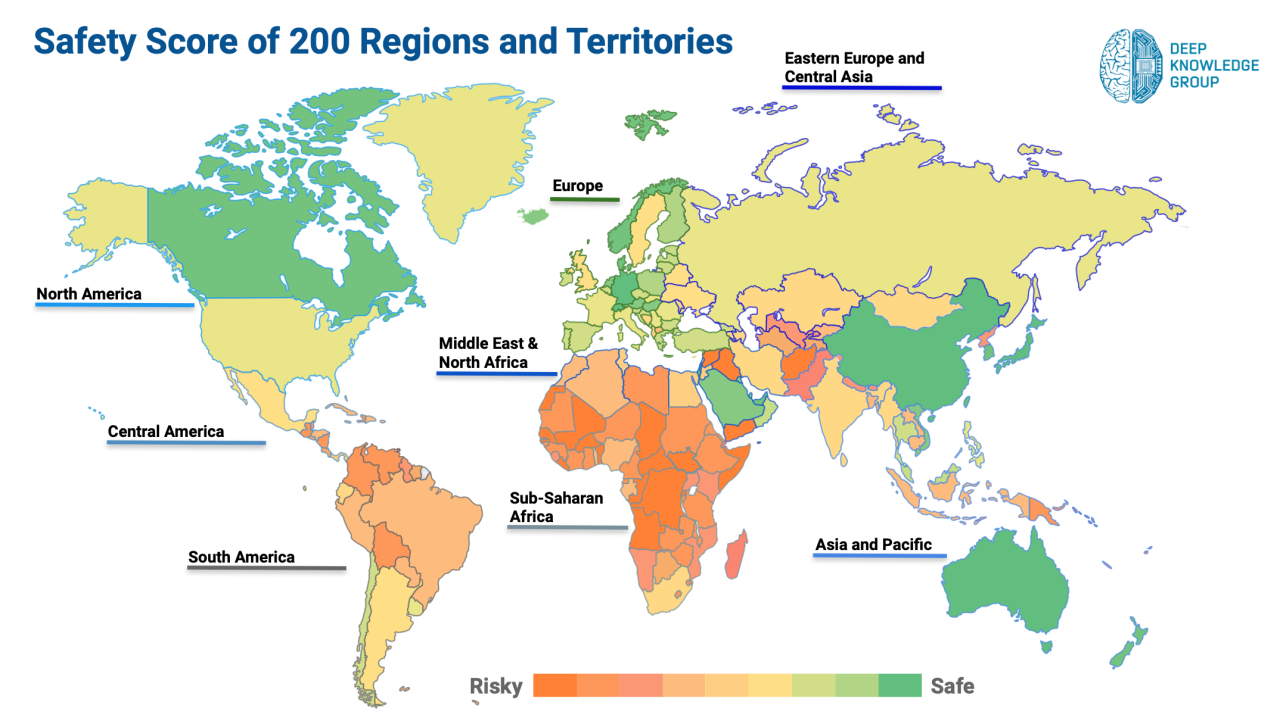
In conclusion, traveling the world safely requires careful planning and awareness. This guide has provided a comprehensive overview of crucial aspects, from visa requirements and travel insurance to understanding cultural nuances and handling emergencies. Remember, responsible travel is about respecting the destination and its people while prioritizing your safety and well-being. Enjoy your adventures!
FAQ Summary
What are some essential documents for international travel?
Valid passport, visa (if required), and proof of health insurance are crucial. Check specific requirements for the countries you plan to visit.
How can I protect my personal belongings during travel?
Be mindful of your surroundings, avoid displaying expensive items, and use secure storage options when possible. Use a travel backpack with secure zippers and pockets.
What should I do if my luggage is lost?
File a report with the airline or transportation company immediately, and keep detailed records of your luggage. Contact your travel insurance provider.
How can I stay connected with loved ones while traveling?
Use a portable Wi-Fi hotspot, a mobile phone with international roaming, or utilize messaging apps with data plans for staying connected.


